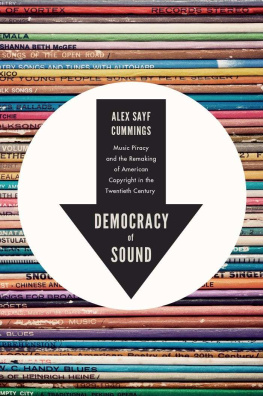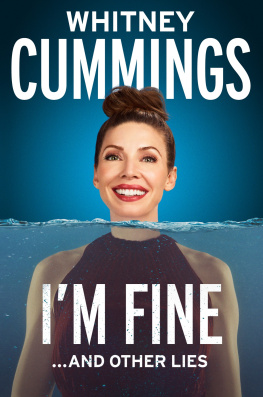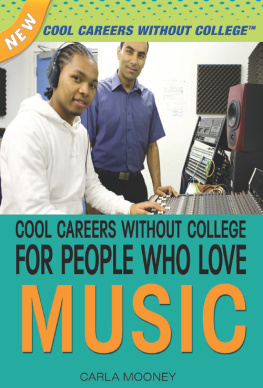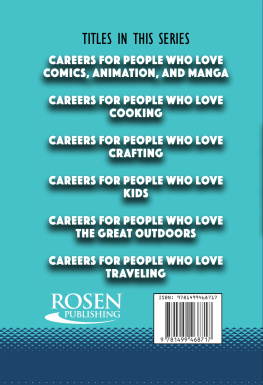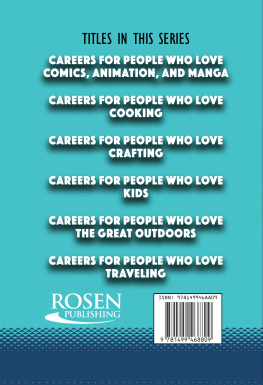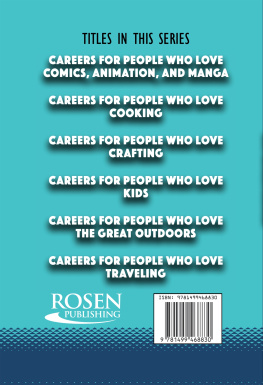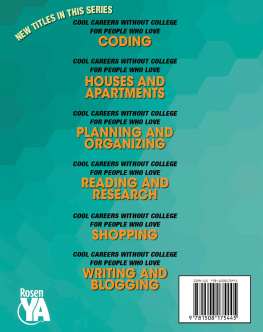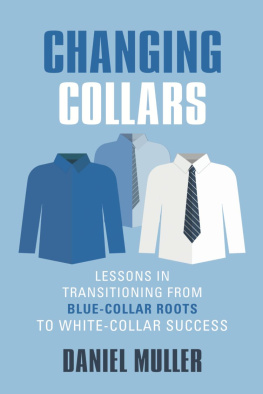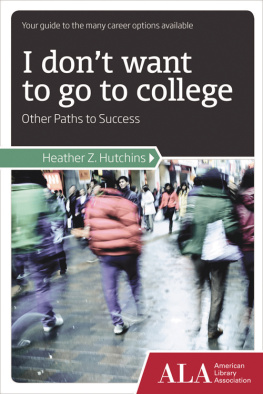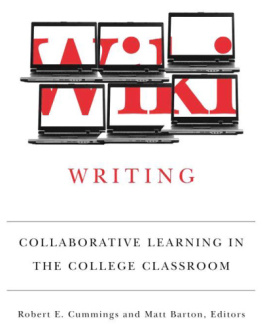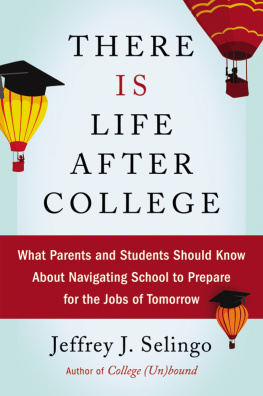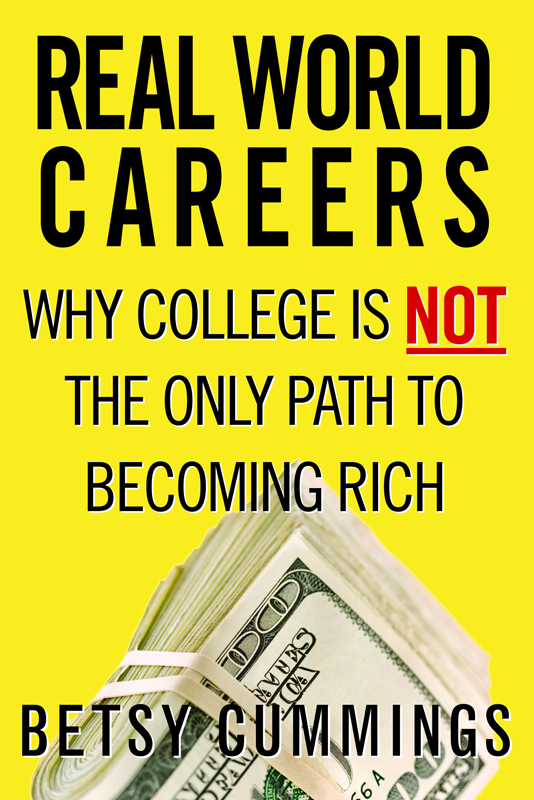The information in this book is as up to date as possible, however, it is sold with the understanding that such information is often subject to new and changing interpretations, government rulings, and legislation. The reader should seek qualified professional help regarding specific questions.
Copyright 2007 by Betsy Cummings
All rights reserved. Except as permitted under the U.S. Copyright Act of 1976, no part of this publication may be reproduced, distributed, or transmitted in any form or by any means, or stored in a database or retrieval system, without the prior written permission of the publisher.
WARNER BOOKS
Hachette Book Group
237 Park Avenue, New York, NY 10017
Visit our Web site at www.HachetteBookGroup.com.
Warner Business Books is an imprint of Warner Books, Inc.
First eBook Edition: January 2007
ISBN: 978-0-446-56144-0
Accelerate your career without a college degree by finding your motivation and tapping into non-traditional learning opportunities. Others have done it, and so can you. In REAL WORLD CAREERS, youll learn from the experiences of people like:
The Entrepreneur. The daughter of hippies, Dana Korey didnt enter a classroom until the second grade. After struggling through high school, she quit college early. Now she runs her own businesswith annual sales of $750,000.
The Sales Wiz. I was 6940 and had an attitude, says Chet Holmes. In the tenth grade, a fistfight got him thrown out of school. Now this high-school dropout is a successful performance consultant whose advice has doubled and tripled sales for dozens of companies.
The Master Chef. At sixteen, Ken Addington entered a city internship program that sparked his interest in food. He skipped cooking school in favor of an apprenticeshipand now makes close to six figures a year as an executive chef at a trendy New York restaurant.
The Manager. Kristin Crocketts enthusiasm plummets in the classroom, but in the real world, shes a dynamo. After leaving college early and starting a low-level job, she rose rapidly through her company ranks, eventually becoming the benefits managerfor 4,000 employees.
The Millionaire. Tim Jordans parents stopped paying for school when it became clear he wasnt focused. Ten years later, he had worked his way up in the mortgage businessand become a millionaire in the process.
Without dismissing college as a means to learn and grow, this stimulating book shows proven alternatives for getting rich without a college education. Anyone looking for guidance and resources needs to get this book. It would make a great gift for the kids you care aboutas well as for yourself.
Joe Vitale, author of The Attractor Factor and Lifes Missing Instruction Manual
I would like to thank Dan Ambrosio and Rick Wolff, my editors at Warner Business Books, who gave me the opportunity to explore such a rich subject. As an author, the career paths of noncollege grads is no small topic to tackle when you consider the myriad job options for Americans who choose such a track. In that sense, my editors helped me formulate, define, and create a robust resource for those job seekers who dont have a college degree but have so much else to offer todays workplace.
Many thanks to experts Ron Krannich, Josh Flowerman, Bruce Palmer, Jim Zuberbuhler, Lou Glazer, Debra Humphreys, Dan Miller of Monster, and others who shed so much light on the job market and opportunities available for those without college degrees. The resources available online and through the U.S. Department of Labor were extraordinary in their data.
A huge thank-you to Marty Nemko, who provided tremendous insight and frank opinions about the value of a college education today.
Amy Barth was instrumental in shedding light on why high school students arent focused enough on their career optionsand how they could take better advantage of the resources at their fingertips.
Richard Weinblatt, Bob Webb, and Beth Youhn provided honest information about the opportunities and challenges todays blue-collar fields offer for both men and women. Personally, I never considered a path other than college when I entered a four-year university program twenty years ago. Today I certainly would. The reason? The stories provided by plenty of people interviewed for this book make clear that there are other options besides a bachelors degree. This book would never have been possible without their input and insights. I certainly hope their stories are as inspiring to readers as they are to me. Those I interviewed over the past year demonstrate that a bachelors degree is, indeed, not the only path to becoming rich.
The College Alternative
T his year, more than sixteen million people will be enrolled in American colleges. Some will go because they want to. Others will be compelled by their parents. Far more will enter one of the countrys four-thousand-plus institutions of higher education simply because they have no better plan. In fact, the number of students heading off to college increases each year, according to the National Center for Education Statistics; it rose by 15 percent between 1992 and 2002.
And what will they get for their four years of academic dedication? A few will launch promising careers. Many more will come out as clueless as they went inuncertain of what inspires them or where their professional talents lie. Theyll trundle off to countless interviews for low-level entry positions that may or may not promise a gateway to higher earnings and more responsibility. Others will take their crisp new hundred-thousand-dollar diplomas and land the jobs so often filled by thousands of graduates each year, working in stores or restaurants, for example, while they figure out what it is they really want to do with their bachelors degrees.
But thats for those who even make it through. More than a quarter will drop out after year one. More than half wont graduate after five years. Many will be like Tim Jordan, an ambitious, hardworking individual motivated by money and success, but not by the structured, lecture-based setup of a classroom, trapped in an educational setting thats not appropriate for him. Jordan, who started at the University of Hartford (not Harvard, he jokes) in Connecticut, called it quits on higher education two years later after transferring to a community college near home, then later the University of Maryland. I took a class here and there but never followed through, Jordan says. I was just having a good time. He is now a millionaire (see chapter 1), but not because of a college degree.
Like many who left the classrooms of higher education, Jordan is driven more by practical experience. College for him was a demoralizing exercise that only slowed him down. Too many people like Jordan waste years wandering aimlessly through esteemed university corridors, never focusing on a specific career or course of study. By the time I left, I should have graduated twice, he says, but I didnt.
Who should go to college? Probably only those whose legal, medical, and educational careers demand that they do. Or those who simply love to learn in an academic setting. We genuflect before higher education as being this nonprofit opportunity to grow the mind and become a connoisseur of learning and all this high-minded stuff, says Marty Nemko, a career consultant and co-author of Cool Careers for Dummies. In reality that is simply not the case. When you pull the curtain away from the PR rhetoric colleges put out nonstop and look at what kids learn... the amount of critical-thinking skills is paltry [next] to the amount of money and time spent on a four-year program.



